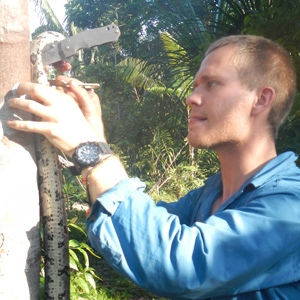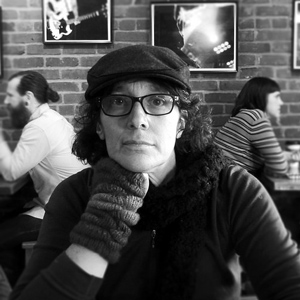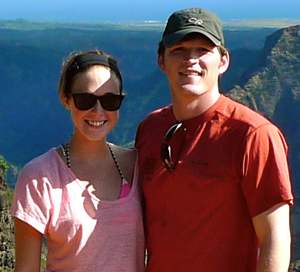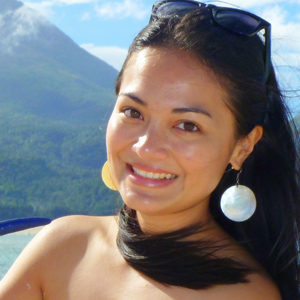Daily Life in a 180-Square-Foot Motorhome: On the Road with Mike Rigney
This is a travel hacking case study. (Read others or nominate yourself.)
Why does someone move out of a big house and into a motorhome? What lessons do they learn, and how does their life change? Here’s Mike.
Introduce yourself!
Hello! I’m a 29-year-old mechanical engineer from Port Huron, Michigan now living in San Diego, California. For the last two years, I’ve lived in a motorhome that I parked on the streets—and recently, I moved onto a sailboat. I’m a minimalist at heart, and I value adventure above all else.

Why do you love to travel?
I studied abroad in college, and would take weekend trips with other students. Then, I decided to do a week-long solo trip to rural Hungary to find some distant relatives. That feeling of traveling solo, with a sense of adventure and the thrill of the unknown, had me hooked.
What inspired you to choose to live in unconventional housing?
I had moved from Michigan to Florida, and then Florida to California, and accumulated a lot of stuff along the way. I thought that’s what becoming an adult was all about. Buying a couch, home decor, a bedroom set. I was getting ready to move out of a house that I was renting with some friends, and realized that half of my stuff was still packed in boxes, untouched, from when we first moved in.
Then, I saw a TED talk by Graham Hill called, “Less Stuff, More Happiness,” and that did it. I decided to downsize and cross living in an RV off my bucket list.
Living in non-traditional homesteads has allowed me to save money for my real passion of traveling. But there’s more than that—this lifestyle is just who I am.
How did your life change after you moved into the RV?
It’s amazing how you can grow an emotional bond to your possessions. I was surprised though, that once you start eliminating all the unneeded things you begin feeling a burden releasing. It’s very freeing. That feeling of freedom started to overcome the attachment I felt to my belongings and it got easier and easier.
The other big lifestyle change was that because a 23′ motorhome isn’t exactly a lot of space, I spent more and more time outside of my home. I would go to coffee shops to work or read. I spent a lot of evenings walking around the city and found myself watching the sunset nearly every night.
Did you feel similarities between living in an RV and when you would travel?
Absolutely. Due to parking restrictions, I had to move my RV every few days, so I was often waking up in a new place. It got to the point where I would walk out of my RV in the morning and be completely confused as to where I was.
Tell us a memorable story from your travels.
While in Africa for a two-month trip last year, I had a week gap between travel plans. I decided to head into Mozambique for some time on the beach, but unfortunately didn’t obtain a visa first. My bus left me at the border, unable to enter the country.
Luck was on my side however, when I met a group of European exchange students while bribing my way into obtaining that missing visa. They were taking a road trip and offered me a spot in their van, which I readily accepted. I ended up spending seven days exploring the country with that wonderful group of people. They even dropped me off at the airport at the end of our journey together; not only were they flying out of the same city in South Africa as me, but their flights were within two hours of mine.
Leaving flexibility in plans can lead to opportunities I never would have experienced otherwise. That applies to day-to-day life, too.

Describe your travel style. How does it mirror your living style?
I carry as little as possible and always strive to bring only a backpack. That’s not always possible with the types of trips I go on, but that’s the goal. Traveling light lets me be much more spontaneous than if I were to lug around a big roll-aboard suitcase.
Besides that, I always prefer staying in a hostel over a hotel and my goal while traveling is to do things rather than just see things. I would rather practice jungle survival in Peru than look at a cathedral in Rome, for example.
How many miles/points do you have banked?
I’ve earned a total of ~865,000 miles. While a (very) small percentage of these miles were actually flown, the vast majority were earned through credit cards. The breakdown is: 225k miles with United, 450k miles with American, 100K with Delta, 50k with BA, and 40k with Barclays. I still have around 530k of those miles in the bank.
The great debate: aisle or window?
Aisle for long-hauls, window for short, scenic flights.
Did you encounter naysayers when you adopted this lifestyle?
Funny enough, most people were genuinely interested in the idea. I had more concerns than anyone else: if this would negatively affect my career (it absolutely didn’t), if girls would still date me (they did—I have a girlfriend who I met while living in the motorhome!).
I think that most people are excited to hear about people living their lives a little different than what’s considered normal.
Best travel tips. Go:
1. Bring carabiners.
I always pack a few carabiners and several 4 and 8-foot lengths of paracord. I have used them in some fashion on every trip I’ve taken.
2. Underpack.
It’s nearly impossible to pack too lightly. If you really need something you didn’t bring, they’ll almost certainly sell it where you’re traveling to.
3. Invest in quick-dry supplies.
Towels, socks, pants… everything! Being able to wash something in the sink and wear it the next day is amazing.
Where to next?
I’m resigning from my job next month to crew on a 45′ sailboat traveling on a one-year journey from Spain to Australia. We’ll cross the Atlantic, through the Panama Canal, and across the Pacific while hitting every island possible in the process.
—
Follow Mike’s journey on his blog, Life with Lindy or via Twitter @mike_rigney.
###







